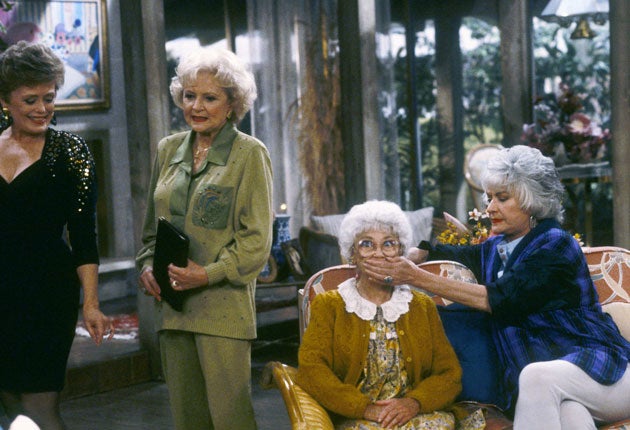Bea Arthur: Actress who found fame as the acid-tongued Dorothy in 'The Golden Girls' sitcom

A husky voice and acid tongue were the trademarks of Bea Arthur's best-known television characters, most famously Dorothy Zbornak, one of four divorced or widowed women living out their twilight years together in a Miami house, in the American sitcom The Golden Girls (1985-92).
Dorothy was a direct television descendent of Maude Findlay, whom Arthur played in two episodes of All in the Family (1971-2), based on the British sitcom Till Death Us Do Part and starring Carroll O'Connor as the bigoted Archie Bunker, an American Alf Garnett.
After making her mark as the self-assured feminist and liberal cousin of Archie's wife, Arthur was quickly spun off into her own series, Maude (1972-8), living in the New York suburbs with her fourth husband and divorced daughter, and cursing those who crossed her with the words: "God'll getcha for that!" The programme was notable for dealing with controversial issues such as abortion and alcoholism.
The actress's 5ft 91/2in stature and deep voice reinforced the dominant nature of her strong characters. "In some ways, I am Maude," she said. "Like her, I'm a liberal. It just eats me up when I see somebody being dishonest. I'm the sort of person who goes through life taking landlords to small-claims court."
When Susan Harris, a writer for both series, created The Golden Girls, she had the idea of casting Bea Arthur in a similar role, as an outspoken, cause-espousing, liberal divorcée. The groundbreaking programme, the first American series to boast an all-female starring cast, also featured Rue McClanahan as the sex-mad Blanche, who owned the house, Betty White as the loveable but dippy Rose, and Estelle Getty as Dorothy's sharp-tongued, octogenarian mother Sophia (who was actually 15 months younger than Arthur but made up to look 20 years older). Again, taboo subjects such as gambling and homosexuality were tackled.
Arthur was born Bernice Frankel in New York City in 1922, the daughter of department store owners, and, at the age of 11, moved with her family to Cambridge, Maryland. She attended Linden Hall High School, Pennsylvania, and Blackstone College, Virginia, and trained as a laboratory technician at the Franklin Institute of Science and Arts, before taking a drama course at the New School for Social Research, in her home city.
After marrying the screenwriter Robert Alan Aurthur, she adopted the professional name Bea Arthur, taking a contraction of his surname and expanding on the "B" by which she had long been known. (Later, she would expand it again, to Beatrice.) Arthur took many roles at the Cherry Lane Theatre, Greenwich Village, during the three years before her divorce, in 1950, when she married her second husband, the actor and future director Gene Saks. She also sang in nightclubs.
In 1955, Arthur made her Broadway début as Madame Suze in the musical Seventh Heaven (American National Theatre Academy Theatre). She subsequently played Lucy Brown off-Broadway in a revival of The Threepenny Opera (Theatre de Lys, 1955) and Yente, the matchmaker, in the original Broadway production of Fiddler on the Roof (Imperial Theatre, 1964), starring Zero Mostel.
Another original Broadway production, Mame (Winter Garden Theatre, 1966), directed by Gene Saks, won Arthur a Tony Award as Best Supporting Actress in a Musical for her performance as the drunken actress Vera Charles, alongside Angela Lansbury's eccentric bohemian, Mame Dennis. Arthur reprised her role, with Lucille Ball in the title role, in a 1974 film version, again directed by Saks. This character – described by one critic as "a portrait in acid of a savagely witty, cynical and serpent-tongued woman" – was a forerunner to the actress's best-known television alter egos.
Until then, her screen appearances had been few. She made her television début singing in Once Upon a Tune, in 1951, and gained some straight-acting experience in plays in the anthology series Studio One (1951-3) and Kraft Television Theatre (1951-8).
But it was Maude that made Arthur a television star. She then had a guest role in the madcap sitcom Soap (1980, written by Susan Harris) and played a dole office clerk in the Mel Brooks-written and directed film musical comedy History of the World: Part I (1981), before starring as the hotel owner Amanda Cartwright in Amanda's (1983), a less than successful American attempt to emulate Fawlty Towers.
The success of The Golden Girls was more than consolation, although Arthur decided in 1992 that it was time to leave, after seven years and 180 episodes. As a result, the other three stars were spun off into the short-lived The Golden Palace, in which their characters ran a Miami Beach hotel. Arthur made a cameo appearance in one two-part episode (1992). More recently, she enjoyed guest roles in the popular sitcoms Malcolm in the Middle (2000) and Curb Your Enthusiasm (2005).
Arthur won two Emmy Awards as Outstanding Lead Actress in a Comedy Series, for Maude (1977) and The Golden Girls (1988). In 2002, the actress's own show, Bea Arthur on Broadway: Just Between Friends, ran for two months at the Booth Theatre. She was an active fundraiser for Aids and animal rights charities.
Anthony Hayward
Bernice Frankel (Bea Arthur), actress: born New York City 13 May 1922; married Robert Alan Aurthur (marriage dissolved 1950), 1950 Gene Saks (marriage dissolved 1978; two sons); died Los Angeles 25 April 2009.
Join our commenting forum
Join thought-provoking conversations, follow other Independent readers and see their replies
Comments
Bookmark popover
Removed from bookmarks